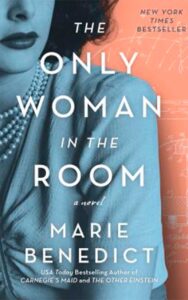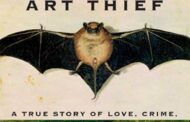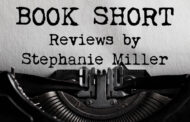Book Short
The Strong Pioneering Women Edition
By Stephanie Miller
A beautiful actress desperate to make good on her forced complicity with the Nazis patented the idea of multi-modal radio frequency that became the basis for all our mobile phones—and never got credit or the chance to see her solution applied to the war effort. A society bride and the wealthiest woman in America claims her late father’s seat as chairman of the board of one of the country’s largest companies, simultaneously remaking herself as a corporate titan, philanthropist, and presidential hostess. I always love reading about anyone (particularly women) changing the world. Last month I read two bestselling novels by different authors that each feature the life of a pioneering woman who met resistance and discrimination head on.
“The Only Woman in the Room,” by Marie Benedict

By Marie Benedict
Sourcebooks Landmark | 2019 | pp. 336
“The Only Woman in the Room” is by Marie Benedict, author of “Carnegie’s Maid” and “The Personal Librarian.” It’s a light-touch on the amazing story of actress and WW2-era scientist Hedy Lamar. Years ago, I read the wonderful non-fiction “Hedy’s Folly” by Richard Rhodes which was much more about her scientific work. Benedict’s novel focused mostly on Hedy’s early, abusive marriage to a weapons manufacturer in Austria (one of the sources of her knowledge of German submarines which led to her invention), her tense relationship with her mother, and her daring escape to California for a glamorous but not entirely happy life in Hollywood.
Lamar has such an amazing story, not the least of which was the rejection of her radio-jamming idea by the US Navy, despite the frantic and failing race to break the stranglehold of the German U-boats in the Atlantic. I don’t love that Benedict’s novel focuses more on her love life than her multiple careers and scientific brilliance, but this is a quick and interesting read.
“The Magnificent Lives of Marjorie Post” by Allison Pataki
“The Magnificent Lives of Marjorie Post” by Allison Pataki is the story of the Post Cereal (later General Foods) heiress and her unconventional life choices. This one also focuses a lot on Post’s many marriages (spoiler: four times a bride, but never found lasting love). What I found fascinating is her ability to manage the political and misogynist corporate nonsense to take her father’s place as chairman of the company, where she innovated product lines and was a bit of a shark when it came to acquisitions. Perhaps her experience dealing with haughty, judgmental society matrons served her well in the halls of business. She also fed the homeless during the depression, saved priceless treasures from the Tsar that were languishing in a Russian warehouse, and hosted presidents and celebrities at her several homes. Her fascinating life and huge ego make this a wonderful adventure story.
Both Lamar and Post had a similar life philosophy. Think for yourself, study and read voraciously, be charming but not soft, give back, love with abandon, and wear your diamonds with style and grace. These two novels provide a glimpse into the epic lives of these two extraordinary women. They had to battle for self-determination and yet through sheer force of personality and will, lived full, satisfying, and compassionate lives.
Micro Shorts
“Bird In Hand,” by Christina Baker Kline (MAINE AUTHOR)
From the author of “Orphan Train” and “The Exiles,” this short novel tackles some really big life choices: love, marriage, parenthood, friendship, and obligation. On a late, rainy drive home, Alison collides with another car running a stop sign—and her life goes sideways. Her husband’s accusatory reaction reveals cracks in their relationship that she never noticed before—and now she sees everything differently. She discovers that the life she carefully constructed for herself is a charade, and now in shambles.
This is a fast moving novel that tackles the “best friend steals husband” trope with a kind and thoughtful hand. Layers of secrets are revealed and betrayed. No one ends up very happy in the end, but they all make new choices from places of strong self-awareness, and there is a lot of hope for the future.
“The Hidden Life of Cecily Larson,” by Ellen Baker (MAINE AUTHOR)
This sweeping family drama is driven by secrets revealed by an at-home DNA test. What everyone thought would be a fun surprise for their ninety-four-year-old grandmother Cecily, turns out to expose a complex web of mothers reluctantly or cruelly forced to give up their babies for adoption. Cecily’s extraordinary life includes an orphanage in Chicago, imprisonment in a home for “wayward” girls, and an apprenticeship to become a bareback circus performer where she falls in love with a roustabout named Lucky. Later she has a life-changing visit to a TB hospital. I was fascinated to learn that women stayed in an outdoor pavilion in the hopes that 24-hour fresh air would cure them.
The key to the novel is illustrated by this quote from Cecily’s daughter, “Now, fifty-two years later, Clarissa walked and walked, not knowing who her parents were; who she was, after all this time. Nor did she feel consoled by the idea that within days the DNA test would likely tell her. What if she learned the truth of where she came from—and it only made everything worse?”
It is a fascinating and compassionate telling of how a truly modern secret keeper —our DNA—has exposed suppressed family histories and reconnected millions of adopted people with their birth parents, unknown siblings, and relatives.
“The Fifth Child,” by Doris Lessing
Doris Lessing did not shirk from the stark, evil side of human nature. In this short novelette she tells the hair-raising story of a mother who gives up everything for one of her children. This fifth child, Ben, is monstrous in appearance, abnormally strong, demanding, and brutal. His abusive nature turns her former welcoming home into an intolerable prison. Her extended family, once happy to take advantage of her hospitality, make excuses to go elsewhere for the holidays. Her other children escape to school and relatives’ homes. Meanwhile, her husband buries himself in his work. When the well meaning family intervenes and puts Ben in an asylum, intending to turn their backs on him forever, the mother rescues him from a horrifying existence of straitjackets and over medication. That choice isolates her from everyone else.
Friendless his whole life, he becomes a gang leader at school. Then she realizes that there may be a role for Ben to play in our world. She doesn’t like Ben very much and hopes he will leave home. But until he does, she will stay. It’s in many ways a beautiful story of motherly love. Also, as it was written in 1988 before our current understanding of neurodiversity, it’s a very insightful and empathetic telling of the desperate struggle of a divergent child trying to fit in with “normal” society.
“Ash,” by Malinda Lo
I found this reimagining of Cinderella on The Lucky Fox Bookshop stand in a market on Congress Square Park. Find them at: theluckyfoxbookshop.com. Stopping here, I always see a half dozen books that I already love and get introduced to several new authors. This queer-owned, indie bookseller specializes in fantasy, fiction, and LGBTQ+ books and “Ash” is a great combo of all three!
When “Ash” was published in 2009, Lo is credited with creating one of the first lesbian characters in the Young Adult genre. And wow, what a heroine. It’s the story we all know but with no emotional mute button. “Ash” gives us full-throated and richly written grief, despair, hunger, love, and a whole heaping of lushly drawn fairie. It deserves to be a staple on every teenage bookshelf, with our thanks for opening up the YA canon to the girls (and boys) who were left out of the original fairy tales.





